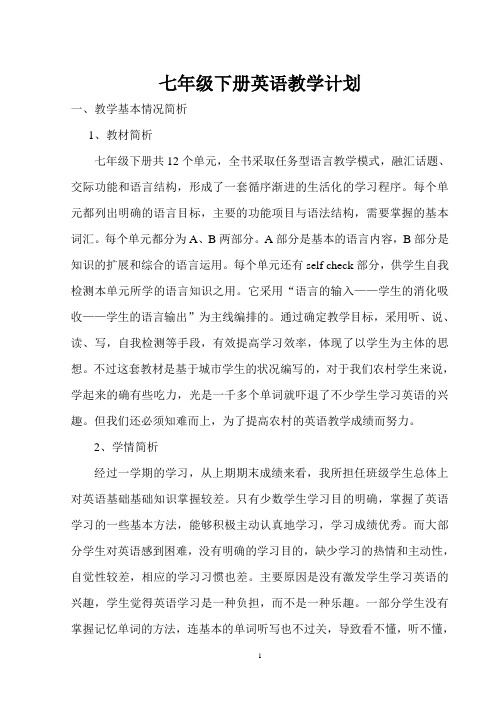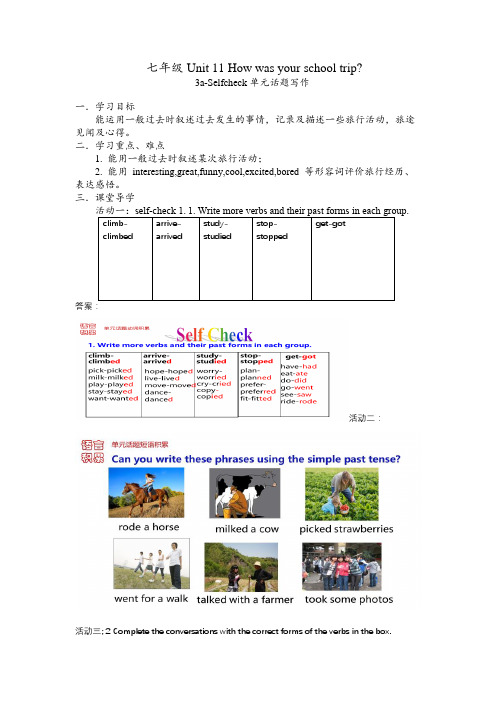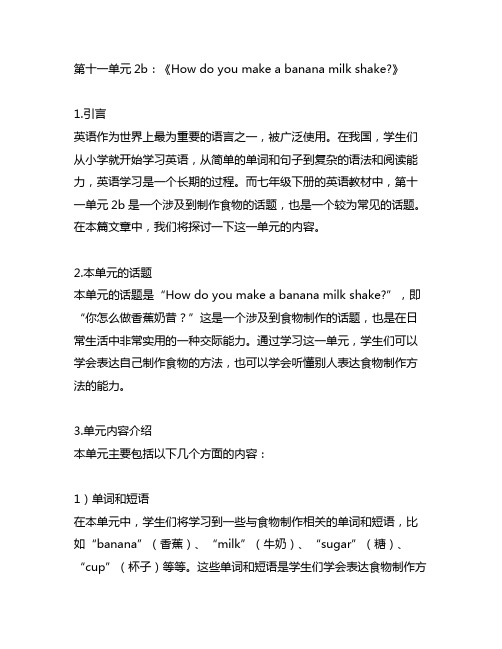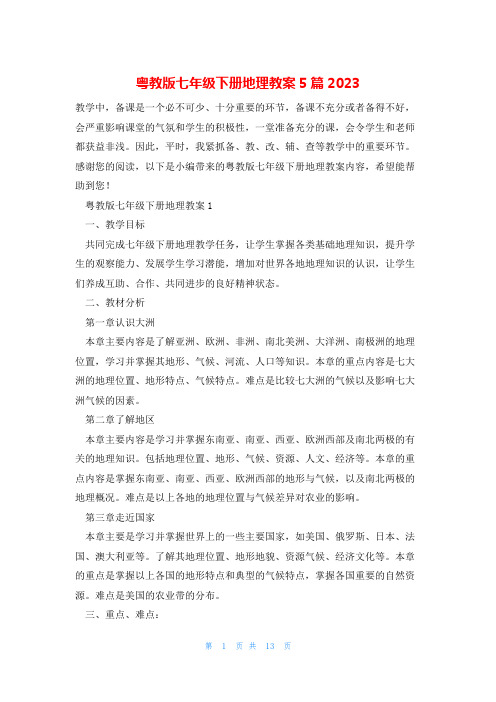七年级下第十一单元教案
人教版七年级英语下册全册备课教案

七年级下册英语教学计划一、教学基本情况简析1、教材简析七年级下册共12个单元,全书采取任务型语言教学模式,融汇话题、交际功能和语言结构,形成了一套循序渐进的生活化的学习程序。
每个单元都列出明确的语言目标,主要的功能项目与语法结构,需要掌握的基本词汇。
每个单元都分为A、B两部分。
A部分是基本的语言内容,B部分是知识的扩展和综合的语言运用。
每个单元还有self check部分,供学生自我检测本单元所学的语言知识之用。
它采用“语言的输入——学生的消化吸收——学生的语言输出”为主线编排的。
通过确定教学目标,采用听、说、读、写,自我检测等手段,有效提高学习效率,体现了以学生为主体的思想。
不过这套教材是基于城市学生的状况编写的,对于我们农村学生来说,学起来的确有些吃力,光是一千多个单词就吓退了不少学生学习英语的兴趣。
但我们还必须知难而上,为了提高农村的英语教学成绩而努力。
2、学情简析经过一学期的学习,从上期期末成绩来看,我所担任班级学生总体上对英语基础基础知识掌握较差。
只有少数学生学习目的明确,掌握了英语学习的一些基本方法,能够积极主动认真地学习,学习成绩优秀。
而大部分学生对英语感到困难,没有明确的学习目的,缺少学习的热情和主动性,自觉性较差,相应的学习习惯也差。
主要原因是没有激发学生学习英语的兴趣,学生觉得英语学习是一种负担,而不是一种乐趣。
一部分学生没有掌握记忆单词的方法,连基本的单词听写也不过关,导致看不懂,听不懂,学不懂。
学生的听力也还有待提高,在这方面失分也较多。
主要是听的时间太少,接触英语的时间不多。
还有极少部分学生已经放弃学习英语。
二、指导思想根据七年级学生的生理及心理特点和本学期的英语教学目标,我确定了如下的教学指导思想:激发学生学习英语的兴趣,培养他们学习英语的积极态度,使他们建立学习英语的自信心;培养学生的语感和良好的语音、语调基础,使他们形成初步运用英语进行日常交流的能力,为进一步学习打下基础。
七年级下册 英语 第十一 单元 Unit11SB3a-3c过程性写作旅行日记

七年级Unit 11 How was your school trip?3a-Selfcheck单元话题写作一.学习目标能运用一般过去时叙述过去发生的事情,记录及描述一些旅行活动,旅途见闻及心得。
二.学习重点、难点1. 能用一般过去时叙述某次旅行活动;2. 能用interesting,great,funny,cool,excited,bored 等形容词评价旅行经历、表达感悟。
三.课堂导学活动二:活动三; 2 Complete the conversations with the correct forms of the verbs in the box.1. A: I went to the countryside this summer.B: Really? How ____ the trip?A: It ___ great!B: What ___ you __ there?A: I ___ the chickens and _____ in a river.2. A: ___ you ____ a nice weekend?B: Yes, I did.A: ____ you ___ anywhere?B: Yes, I _____ to the mountains.The air ____ so clean and I ___ a lot of flowers.答案:was,was,did,do,fed,swam,did,have,did,go,went,was,saw.活动四:1.turn the two dialogues into passages.1. A: I went to the countryside this summer.B: Really? How was the trip?A: It was great!B: What did you do there?A: I fed the chickens and swam in a river.2. A: Did you have a nice weekend?B: Yes, I did.A: Did you go anywhere?B: Yes, I went to the mountains.The air was so clean and I saw a lot of flowers.答案:1.I went to the countryside this summer. I fed the chickens and swam in a river. It was great! 2.I had a nice weekend. I went to the mountains. The air was so clean and I saw a lot of flowers.活动五:plete these sentences using the suitable adjectives.A: I went to a farm on my last school trip.There were many animals on the farm.They were very lovely.B: That sounds great.A: How was your school trip?B: It was _________.A: How was the food there?B: It was ____________ .A: How was the weather?B: It was __________________.答案:exciting, delicious, warm and sunny.活动六:Complete these sentences according to the pictures.Last weekend, The weather was__________. I went to a _____. I _____________. And I _____________________. I was very___________.(激动)答案:1.sunny,farm,milked a cow, talked with a farmer, excited活动七:1.Look at the pictures of Bob’s school trip. Complete his diary entry.June 23rdYesterday my school visited the zoo. It was really ____________. We went there by bus. At the zoo, I saw a lot of __________ and I took some photos. My classmates and I also went to the __________ and bought some _____. It was a great day.答案:interesting,animals,gift shop,gifts.2. Lind a is Bob’s classmate. Complete her diary entry.June 23rdMy school went to the zoo yesterday. The trip was _______.At the zoo, I ____________________ but I didn’t like them. I also went to ______________with my classmates, but I didn’t buy anything becau se __________________________. It was a boring day.答案:b oring, saw many animals, gift shop, they’re too expensive.活动八:活动九:活动十:活动十一:活动十二:。
七年级下册英语第十一单元2b

第十一单元2b:《How do you make a banana milk shake?》1.引言英语作为世界上最为重要的语言之一,被广泛使用。
在我国,学生们从小学就开始学习英语,从简单的单词和句子到复杂的语法和阅读能力,英语学习是一个长期的过程。
而七年级下册的英语教材中,第十一单元2b是一个涉及到制作食物的话题,也是一个较为常见的话题。
在本篇文章中,我们将探讨一下这一单元的内容。
2.本单元的话题本单元的话题是“How do you make a banana milk shake?”,即“你怎么做香蕉奶昔?”这是一个涉及到食物制作的话题,也是在日常生活中非常实用的一种交际能力。
通过学习这一单元,学生们可以学会表达自己制作食物的方法,也可以学会听懂别人表达食物制作方法的能力。
3.单元内容介绍本单元主要包括以下几个方面的内容:1)单词和短语在本单元中,学生们将学习到一些与食物制作相关的单词和短语,比如“banana”(香蕉)、“milk”(牛奶)、“sugar”(糖)、“cup”(杯子)等等。
这些单词和短语是学生们学会表达食物制作方法的基础,也是日常交流中经常使用的词汇。
2)句型和语法除了单词和短语,本单元还涉及到了一些与食物制作相关的句型和语法。
“First, peel three bananas.”(剥三根香蕉。
)、“Then, put them in the blender.”(把它们放进搅拌机中。
)等等。
通过学习这些句型和语法,学生们可以更加自如地表达自己的食物制作方法。
3)听力和口语在本单元中,还有一些听力和口语训练的内容。
学生们将通过听录音和跟读的方式,加强自己的听力和口语能力,提高自己的语音和语调。
4.教学方法和建议在教授本单元内容时,老师可以采用多种多样的教学方法,比如图片教学、游戏教学、角色扮演等等。
老师可以通过图片展示,让学生们更直观地了解食物的制作过程;也可以通过小组合作的形式,让学生们模拟制作食物的过程,加强他们的口语表达能力。
七年级第一次课教案

尧旭教育个性化辅导授课案教师:学生:时间:年月日段一、授课目的与考点分析:第十一单元新课二、授课内容:1.electricity n.电;电能Do you use electricity for cooking?你用电做饭吗?2.lightning n.闪电He moved like lightning.他行动快如闪电。
The tree was struck by lightning.那棵树被雷电击中了。
3.pylon n.电缆塔The helicopter lifted up the steel pylon,transported it to the site, and dropped it gently into place.直升机把高压电缆铁塔吊起,运至工地,然后轻轻放下使之就位。
4.flash v.(使)闪耀;闪光The disco lights flashes on and off.迪斯科舞厅的灯光忽明忽暗。
I saw something flash past the window.我看见有个东西在窗户那儿一闪而过。
5.thunder n.雷;雷声After the lightning came the thunder.闪电后接着便是雷声。
【联想】thunder v.大声喊出;打雷:‘Get out!,he thundered. “滚出去!”他大声吼道。
My little dog always hides under the bed when it thunders.我的小狗一听到打雷就躲到床底下。
6.crash v.(使)发出巨响The motorcycle crashed into the fence.摩托车猛地撞在围栏上。
7.wire n.电线;导线electrical wires 电线 a piece of wire —段金属丝7.fright n.惊吓;恐怖The loud thunder gave me a fright.这声响雷把我吓了一大跳。
人教版七年级英语下册第十一单元教案

UNIT11 How was your school trip?Period 1 Section A 1a-2cTeaching aims:New words: milk, cow, horse, feed/fed, farmer, quite, anything, grow/grew, farm, pick, rode; took; sawTarget language:How was your school trip? It was great!Did you go to the zoo? No, I didn’t. I went to a farm.Did you see any cows? Yes, I did. I saw quite a lot.Did Carol ride a horse? No, she didn’t. But she milked a cow.Were the strawberries good? Yes, they were. No, they weren’t.What did Carol do? She picked some strawberries.Ability objects:Can use the past tense to talk about the things in the past.Key points:1. remember some past tense forms of some verbs.e the past tense to talk about the things in the past.Teaching difficulty:use the past tense to talk about the things in the past.Teaching procedures:Step 1 Warm-up.1.Greeting.2.Check what the students have learned before class. Watch the video and the pictures.Get the students to say the new words.Step 2. New language presentation.1.Let’s go the happy Farm.T: What can we see on the happy farm. And what can we do on it?(use the present tense to answer.)2.read the all the words.3.Explain the time phrase “last weekend”is a past time period. Show on the screenmore picturesPresent the picture of Carol. Get the students to guess “What did she do on the farm?”Present the verb phrases “milked a cow, rode a horse, fed chicken, talked with a farmer”by showing more pictures. These are all farm activities. Get the students to think more possible farm activities.4.Chant. Get the students to do a chant with the rhythm Two tigers.What did they do? What did they do?Went for a walk. Went for a walk.Milked a cow.Rode a horse. Rode a horse.Step 3 Activity 1a.1. Get the students to read through the pictures in Activity 1a. Match the phrases with thepictures. Check the answers with the class.2. Write down the verb base form for the verbs in these phrases. Check the verbs. Thentry to read the recite the verbs and their respondent past form.(go-went, milk-milked, ride-rode, feed-fed, talk, talked, take-took)Step 4.Guessing game)1. Present the sentence “I had a good time last weekend. ”on the screen. Note thatlast weekend is a past time period. Change the sentence into the General Interrogative Question “Did you have a good time last weekend?”Help the students to answer “Yes, I did./ No, I didn’t.”2. Have guessing game. Get the students to guess “What did Mr Fang do lastweekend?”by asking “Did you …(加词组原形) last weekend? ”(went to a park) Guess in the same way what Mr Fang saw in the park.Step 5 Activity 1b.Get the students to have a listening practice. Get the students to listen to Listening Cassette Activity 1b. Listen and circle the three things Carol did on her school trip in 1a.Check the answers with the class.Step 6 Activity 1c.1.Get the students to read through the dialogue in Activity 1c.2.Try to read and recite the dialogue.3.Then work in pairs and make up similar dialogue talking about farm activities after themodel.Step 7 Activity 2a/2b.1. Get the students to read through the questions in Activity 2a. Listen and check(√) thequestions you hear. Check the answers with the class.2. Read through the sentences in Activity 2b. Circle T for true and F for false. Check theanswers with the class. Underline the phrase ”learn a lot about farming, grow strawberries, pick strawberries”.Step 8 Activity 2c.1. Get the students to read through the dialogue in Activity 2c. Work in pairs and make up dialogue talking about Carol’s past events on the farm.2. Suppose you went to the farm last weekend. Work in pairs and make up a new dialogue taking about the trip. Perform it before the class.Step 9 Grammar Summary.1. Present some verbs and their past forms(some unlearned).2. Get the students to summarize the rules for the regular past forms. Present some verbsand correspondent regular past form.3. Work in groups and finish the exercise on the screen.Step 10. Homework.1. Copy the new words on Page 51 four times.2. Recite and copy the verbs and their past forms.Period 2 Section A 2d-grammarTeaching aims:New words: excellent, countryside, yesterday, flower, worry, luckily, sunTarget language:How was your school trip? It was great!Did you go to the zoo? No, I didn’t. I went to a farm.Did you see any cows? Yes, I did. I saw quite a lot.Did Carol ride a horse? No, she didn’t. But she milked a cow.Were the strawberries good? Yes, they were. No, they weren’t.Ability objects:Can use the past tense to talk about the things in the past.Key points:1. remember some past tense forms of some verbs.e the past tense to talk about the things in the past.Teaching difficulty:use the past tense to talk about the things in the past.Teaching procedures:Step 1 Warm-up.1. Revise the verb phrases in Activity 1a.2. Guessing game.Show on the screen some activity pictures of past events. Get the students to guess “Did he/ she/ they do …?”. This step also helps to revise the past forms.Step 2 Activity 2d)1. Present the photo of a boy Eric and the picture of the farm.. Get the students toguess “What did Eric do there?”. Teach the phrases “went fishing, watch the stars”.2. Get the students and listen to the dialogue in Activity 2d. Underline the key phrases “inthe countryside, went fishing, so much fun”. Underline the sentence “Lucky you”. Explain it in English.3.read the conversation, and answer the questions.4. Role-play the conversation in pairs, in groups.5. Read the conversation again. Show on the screen four questions. Ask and answer in pairs.Step3 Grammar focus.1. Get the students to read through the sentences in this grammar focus. Read and recitethe past forms in the table. Then write out the past forms of the verbs shown on the screen.2. Grammar Explanation.Show on the screen some grammar explanation for the Simple Past Tense. Read and recite the rules for this tense.Step 4 Activity 3a.1. Get the students to read through the two letters in Activity 3a. Complete Jim’s letter on the left and Bill’s reply on the right.2. Check the answers with the class.Step 5. Activity 3b.1. Read the example.2. Students make up the stories.3. Students share their stories.Step 6 Homework.Period 3Section B (1a-2c)Step 1:1 GreetingWhat did you do yesterday ?How were you yesterday ?2 Review: GamesUse your imagation and make up a story. Each student adds a sentence.If he orshe can’t add a sentence,he or she must sing an English song.Step 2 :Preparation 1a1 Match the activities with the pictures.2 Check the answersStep 2 :Listening 1b 1c1 Listen and answer the questions.1 How was Jane’s trip ?2 How was Tony’s trip ?2 Check the answers.3 Listen again. What did Jane and Tony do on their last school trip ? Check Tonyor Jane.Step 3:Speaking 1d1 What was your last school trip like ?Discuss it with your partner with the following words.2 Teach Ss to read the following words :interesting difficult lovely slowexciting boring cool hot lucky largeexpensive terrible decilious great cheap fast3 Discuss like following conversation.A: I went to a farm on my last school trip.There are many animals on the farm.Theyare very lovely.B: That sounds great.A: How was your school trip ?B: It was __________A: How was the food there ?B: It was _____________A: How was the weather ?B: It was ___________Step 4: Prepatation2a Do the following words describe good things or bad things ? Put a √for good and an ×for bad . Leave a blank if they can mean both.Step 5 : Reading 2b,2c1 Read Helen’s and Jim’s diary entries and answer the questions in 2b2 Read the diaries again and complete the chart in 2cHow do Helen and Jim describe these things ?3 Check the answers .Ask Ss to pay attention to the past tenst verbs.4 Explain the language points5 Read the passages aloudStep 6 : Language points and exercises.Period 4Section B (3a-Self check )Step 1:1 GreetingHow are you feeling today?What did you do last night?How was your homework yesterday?2 Review : GamesUse your imagnation and make up a story. Each student adds a sentence.If he orshe can’t add a sentence,he or she must sing an English song.Step 2 : Preparation1.3a Look at the pictures of Bob’s school plete his diary entry.2. 3b Linda is Bob’s classmate. Complete her diary entry.Step 2 : Writing3c Now write a diary entry for your own school trip.Explain if you liked it or didn’t like it and why.Step 3 : Self-check1 Write more verbs and their past forms in each group.2 Complete the conversations with the correct forms of the verbs in the box.3 Check the answers4 Grammar: The Simple Past Tense九年级英语上册期末试卷学校____________________ 姓名__________________ 准考证号__________________听力理解(共30分)一、听对话,从下面各题所给的A、B、C三个选项中选择与对话内容相符的图片。
粤教版七年级下册地理教案5篇2023

粤教版七年级下册地理教案5篇2023教学中,备课是一个必不可少、十分重要的环节,备课不充分或者备得不好,会严重影响课堂的气氛和学生的积极性,一堂准备充分的课,会令学生和老师都获益非浅。
因此,平时,我紧抓备、教、改、辅、查等教学中的重要环节。
感谢您的阅读,以下是小编带来的粤教版七年级下册地理教案内容,希望能帮助到您!粤教版七年级下册地理教案1一、教学目标共同完成七年级下册地理教学任务,让学生掌握各类基础地理知识,提升学生的观察能力、发展学生学习潜能,增加对世界各地地理知识的认识,让学生们养成互助、合作、共同进步的良好精神状态。
二、教材分析第一章认识大洲本章主要内容是了解亚洲、欧洲、非洲、南北美洲、大洋洲、南极洲的地理位置,学习并掌握其地形、气候、河流、人口等知识。
本章的重点内容是七大洲的地理位置、地形特点、气候特点。
难点是比较七大洲的气候以及影响七大洲气候的因素。
第二章了解地区本章主要内容是学习并掌握东南亚、南亚、西亚、欧洲西部及南北两极的有关的地理知识。
包括地理位置、地形、气候、资源、人文、经济等。
本章的重点内容是掌握东南亚、南亚、西亚、欧洲西部的地形与气候,以及南北两极的地理概况。
难点是以上各地的地理位置与气候差异对农业的影响。
第三章走近国家本章主要是学习并掌握世界上的一些主要国家,如美国、俄罗斯、日本、法国、澳大利亚等。
了解其地理位置、地形地貌、资源气候、经济文化等。
本章的重点是掌握以上各国的地形特点和典型的气候特点,掌握各国重要的自然资源。
难点是美国的农业带的分布。
三、重点、难点:1、初步学会运用地图和相关资料,说出各大洲的地形特征和气候特征;2、初步学会运用地图和相关资料,说出几个大国的人文特征,能简单分析人—地内在关系;3、初步学会国家和地区的分析方法;四、教学措施1、认真钻研教材,理清知识结构和教学思路,把握教材重点、难点。
运用现代化教学设施,制作教学道具等,创设教学情境,设置多种课堂教学模式,从而激发学生学习兴趣调动学生的主观能动性和积极性,变被动学习为主动探究。
人教版七年级英语下册第十一单元同步教学设计
1.教学内容:对本节课的职业话题、词汇、语法等进行总结。
2.教学实施:教师引导学生回顾本节课所学内容,总结一般现在时态描述职业特点的用法,以及相关词汇和短语。
3.目标达成:通过总结归纳,帮助学生巩固所学知识,形成知识体系,提高他们的英语素养。
在教学过程中,教师应注重学生的主体地位,充分调动他们的学习积极性,关注学生的个体差异,进行分层教学。同时,教师要以人为本,关注学生的情感态度,培养他们正确的价值观。通过本节课的学习,使学生能够熟练掌握职业相关词汇,提高英语听说读写综合能力。
3.练习:学生进行小组合作,用一般现在时态描述组内成员的职业特点、工作内容等,并进行角色扮演。
4.互动:教师组织学生进行课堂互动,如采访活动,让学生运用所学知识询问他人的职业、工作地点等。
5.巩固:教师设计相关练习题,帮助学生巩固所学知识,提高语言运用能力。
6.总结:教师引导学生总结本节课的学习内容,并进行情感态度与价值观的教育。
人教版七年级英语下册第十一单元同步教学设计
一、教学目标
(一)知识与技能
1.知识目标:通过对本章节的学习,学生能够掌握并熟练运用以下词汇和短语:interview, job, worker, business, company, office, serve, cook, clean, care, write, read, study, play, practice等。同时,学生能够理解并运用一般现在时态描述人物的职业特点及其工作内容。
3.情感态度的引导:学生在对待不同职业的态度上可能存在偏见,教师需关注学生的情感态度,引导他们尊重各种职业,培养正确的价值观。
4.合作学习能力的提升:本章节的教学过程中,小组合作和角色扮演等活动较多,教师应关注学生在合作学习中的表现,提高他们的团队协作能力和沟通能力。
人教版初中英语七年级下册11--12单元讲义重点短语语法归纳配练习答案
人教版初中英语七年级下册十一单元讲义教案UNIT11第一部分【重点短语】给奶牛挤奶去钓鱼骑马喂鸡go for a walk show sb. aroundquite a lot/quite a lot of+n.learn a lot about sth. grow strawberriespick strawberries pick uptake sth. home in the countrysideworry+that从句worry about ……/be worried about ……last week come outIt was so much fun. have so much fun.an art museum the science museumgo on a trip along the waymake a model robot buy sth. for sb.= buy sb. sth.all in all it’s difficult (for sb.) to do sth.not at all be interested in (doing)sth.【答案】从左至右:milk a cow; go fishing; ride a horse; feed chickens; 去散步=take a walk;带领某人参观;相当多的;关于…学到很多;种草莓;摘草莓;捡起/接某人;带…回家; 在农村;担心……; 担心某人某事;上周;出来/出版/开花;如此有趣;玩得非常开心;一个艺术博物馆;科学博物馆;去旅行;沿途;制作一个机器人模型;为某人买某物;总之;对某人来说做某事很困难;根本不/一点也不;对(做)…感兴趣第二部分【重点语法】一、一般过去时1.定义一般过去时表示过去某个时间或一段时间内发生的动作或状态;也可表示过去经常或反复发生的动作。
e.g.I got up at 7:00 yesterday. 我昨天7点起床。
七年级下册英语第十一单元2d
第一节:课前热身1.1 热身环节在开始教学之前,老师可以设计一些简单的英语热身活动,比如口头问答或者快速复习之前学过的内容,让学生们进入英语学习状态。
1.2 教学目标明确本节课的教学目标,比如帮助学生掌握新单词和语法知识,以及培养学生的英语交际能力和阅读能力。
第二节:新知预习2.1 师生互动教师可以通过图文展示或者音频视瓶,引导学生预习本单元的新知识点,激发学生的兴趣,让他们提前了解本节课的内容。
2.2 提出问题教师可以提出一些问题,引导学生思考,激发他们的学习欲望,比如提问一些相关的日常生活话题,引导学生进行交流和讨论。
第三节:新知讲授3.1 新单词教师可以通过图片和示范发音等方式,向学生介绍本单元的新单词,让学生掌握单词的发音、意思和用法。
3.2 语法知识教师可以讲解本单元的语法知识,比如时态、句型结构等,让学生掌握基本的语法规则,提高他们的语言表达能力。
第四节:课堂练习4.1 听力练习教师可以设计一些听力练习,让学生通过听力理解、辨别和掌握本单元的语音、语调和语速。
4.2 口语练习教师可以设计一些口语练习,让学生进行口头表达和交流,提高他们的口语表达能力。
第五节:课后作业5.1 作业布置教师可以针对本单元的内容,布置适量的练习题目,让学生巩固课堂所学知识,加深理解和记忆。
5.2 作业批阅教师可以认真批阅学生的作业,及时给予反馈和指导,促进学生的进步和提高。
第六节:课堂总结6.1 总结反思教师可以通过课堂讨论或者小结,帮助学生总结本节课的重点内容,促进学生对知识的巩固和发展。
6.2 展望下节课教师可以向学生展望下节课的内容和学习重点,激发学生的学习兴趣和学习动力。
第七节:课后延伸7.1 拓展阅读教师可以推荐一些相关的英语阅读材料,让学生进行自主阅读和拓展,提高他们的阅读能力和语言素养。
7.2 学以致用教师可以引导学生将所学知识应用到日常生活中,比如在交流中尝试运用新学到的单词和句型,让学生感受英语学习的实际应用场景。
七年级英语下册_第十一单元学案_新目标[1]
Unit11 What do you think of game shows?Period 1 page 65主备人:审核人:【学习目标】Section A 1a, 1b and 1c.【学习重点】1.词汇:sitcom,soap,mind,stand2.句型: W hat do you think of…?你认为…怎么样?/你觉得…怎么样I like them. / I love them. / I don’t like them. / I can’t stand them. /I don’t mind them.一、课前延伸根据汉语,写出英语。
1.认为,想到:2.游戏节目:3.肥皂剧,连续剧:4.体育节目:5.不能忍受:6.不介意:二、课内探究(一)自主学习1.检查课前预习作业,并教读相应的词汇。
2.看图并完成1a3.完成1c(二)合作探究(1)T:I love sitcoms. What do you think of sitcoms?S1: I love them, too. What do you think of soap operas?S2: I can’t stand. … S3: …… (一个接一个地重复练习该句型)(2)Group work.(以小组为单位,练习上述对话)(3)听录音并完成1b(三)当堂达标连词成句1. soap operas,you,do,what,think,of(?)2. mind , she, doesn’t, them (.)3. can’t , Mark, stand, boring lesson, the (.) 汉翻译成英语。
1.你认为肥皂剧怎么样?do you____ _____ _________?我无法忍受。
太令人厌烦了。
I_______ ______ it. It’s too boring.2.他很喜欢数学课,很有趣。
He math classes. They are三、拓展提升:根据意思填空。
- 1、下载文档前请自行甄别文档内容的完整性,平台不提供额外的编辑、内容补充、找答案等附加服务。
- 2、"仅部分预览"的文档,不可在线预览部分如存在完整性等问题,可反馈申请退款(可完整预览的文档不适用该条件!)。
- 3、如文档侵犯您的权益,请联系客服反馈,我们会尽快为您处理(人工客服工作时间:9:00-18:30)。
七年级下第十一单元教案was your school trip?单元目标分析单元内容分析:本单元以“How was your school trip?”为中心话题,围绕着描述“过去发生的事情”展开,学习和运用一般过去时态的一般疑问句Did you…?及其答语,询问过去的事件,让学生学会谈论和分享过去发生的事件。
本单元教学内容与学生的实际生活密切相关,易于激发学生运用简单的英语进行交际和交流的兴趣。
教学目标:1、知识目标:单词:milk, cow, horse, feed, farmer, quite, anything, grow, farm, pick, excellent, coutryside, yesterday, flower, worry, luckily, sun, museum, fire, painting, exciting, lovely, expensive, cheap, slow, fast, robot, guide, gift, everything, interested, dark, hear短语:milk a cow, ride a horse, feed chickens, quite a lot (of…), in the countryside, fire station, all in all, be interested in句型:How was your school trip ? It was great ! Did you go to the zoo ? No, I didn’t、 I went to a farm、 Did you see any cows ? Yes, I did、 I saw quite a lot、 Did Carol rid e a horse ? No, she didn’t、 But she milked a cow、 Were the strawberries good ? Yes, they were 、No, they weren’t、语法:一般过去时2、能力目标:能运用一般过去时描写过去的事情3、情感目标:学会客观地表达对事物的看法,培养乐观向上的性格教学重点:一般过去时的判断及选用教学难点:正确运用一般过去时教学用具:课本,录音机总课时数:4课时单元知识点梳理一、语法:一般过去时1、用法:表示在过去某个时间或某一段时间内发生的动作或存在的状态。
2、常用的时间状语,即标志词:yesterday, last night, last week, last year, last Monday, two days/years ago , just now, in1999, at the age of5, one day …、3、常用的句式:1)含有be动词的:肯定句:主语+ was / were + 其它。
否定句:主语+ was/ were + not +其它。
一般疑问句:Was/ Were +主语+ 其他?肯定回答:Yes, 主语+ was/ were、否定回答:No, 主语+ wasn’t / weren’t、特殊疑问句:疑问词+一般疑问句?2)含有实意动词的:肯定句:主语+ did + 其它。
(did代表动词的过去式)否定句:主语+ didn’t do +其它。
(do代表动词的原形)一般疑问句:Did + 主语+ do+ 其他?肯定回答:Yes, 主语+ did、否定回答:No, 主语+ didn’t、特殊疑问句:疑问词+一般疑问句?4、动词过去式的构成:规则动词:见课本114页不规则构成:见课本142页二重点词组1、school trip 学校旅行2、go for a walk 去散步3、milk a cow 给奶牛挤奶4、ride a horse 骑马5、feed chickens 喂鸡6、talk with the farmer和农民交谈7、take photos /a photo拍照8、quite a lot许多9、ask some questions问一些问题10、grow apples种苹果11、show sb、 around sp、带某人参观某地12、learn a lot 学到很多13、grow strawberries种植草莓14、from、、、to、、、从…到…15、pick some strawberries摘草莓16、take sth home带…回家17、 visit my grandparents看望我的祖父母18、 last week上周19、go fishing 去钓鱼20、so much 如此多的21、so clean 那么干净22、watch the stars 看星星23、go to the zoo去动物园24、go to a farm去农场25、last year去年26、a lot of fun很多乐趣27、so much fun这么多的乐趣28、climb the mountains 爬山29、a lot of flowers 许多花儿30、eat lunch 吃午饭31、play games 做游戏32ZZZe out 出来33、visit a museum 参观博物馆34、visit a fire station参观消防站35、go to the countryside去乡下36、go on a school trip参加学校旅行37、science museum科学博物馆38、by train 坐火车39、along the way沿途40、play chess with sb、、、和…下棋41、how to do sth 如何做某事42、make a model robot做一个机器人模型43、the gift shop礼品店44、buy sth for sb为某人买…45、all in all总的来说46、take the train to、、、坐火车去…47、on the slow train在缓慢的火车上48、be interested in… 对…感兴趣49、not、、、at all 一点也不,根本不50、at the zoo=in the zoo在动物园51、this summer今年夏天52、 have a nice weekend 有个愉快的周末53、lucky you你真幸运。
三、词汇辨析1、farm,farmer , Farm可数名词农场, on the farm; farmer 可数名词农民,农场主、 farm 动词务农,种田2、worry, worried worry v、担心,担忧 worry about…;worried adj、担心的be worried about…3、milk n、牛奶 drink milk v、挤奶 milk a cow4、 too many, too much, much too too much +不可数名词太多;too many +可数名词太多;much too +形容词太,非常5、不定代词: something 某物,某事常用于肯定句中anything 任何事物,任何东西常用于否定句和疑问句 nothing 什么事都没有表示否定nothing= not …anything everything 所有事物,一切,其后的谓语动词用单数注:1>在表示请求,建议或征求意见的疑问句中常用something。
2>形容词放在不定代词之后 Eg、 something interesting6、 hear, listen to hear 听到,听见强调听的结果listen to 听强调听的动作7、quiet, quite quiet 安静的形容词;quite 相当,完全副词8、–ing,xx学年度七年级班英语教案TitleUnit11 How was your school trip?The typeOf lessonsNew lessonNumber of sectionsDesigner张锦雄Auditor张斌年TeacherDateAnalysis of the Teaching Material【Curriculum requirements】本单元以“How was your school trip?”为中心话题,围绕着描述“过去发生的事情”展开,学习和运用一般过去时态的一般疑问句Did you…?及其答语,询问过去的事件,让学生学会谈论和分享过去发生的事件。
Analysis of the TeachingMaterial:学习一般过去时态和动词的规则与不规定则变化,学习一般过去时态的一般疑问句Did you…?及其答语。
Teaching Aims and DemandsKnowledge ObjectsKey words: milk, cow, horse, feed, farmer, quite, anything, grow, farm, pick, excellent, countrysideKey phrases: milk a cow, ride a horse, feed chickens, quite a lot (of…), in the countrysideSentence structures: How was your school trip ? It was great !Did you go to the zoo ? No, I didn’t、 I went to a farm、Did you see any cows ? Yes, I did、 I saw quite a lot、Did Carol ride a horse ? No, she didn’t、But she milked a cow、 Were the strawberries good? Yes, they were、No, they weren’t、Ability Objects能运用一般过去时描写过去的事情Moral Objects 学会客观地表达对事物的看法,培养乐观向上的性格Teaching Key PointsAnd Teaching Difficult PointsTeaching Key PointsKey words, Key phrases and Sentence structuresTeaching Difficult Points运用一般过去时描写过去的事情Teaching aidsBlackboard, textbooks, tape player、Design of periodPeriod1 Section A1a-2dTeaching ProceduresTeacher-studentInteractionReviseStep I Warming –up1 Greeting Who is onduty today ? Who was on duty yesterday ?What is the weather like today ?What was the weather likeyesterday ?2 Song : Play the song “ Old MacDonald had a farm” and have Ss find out th e animals in the song Get Ss answer like this : On the farm ,there are some ducks, cats, chickens, cows pigs, dogs and horses 、 They are animals、Step ⅡPresentation1 Show a picture and tell Ss: This is also a farm、 Last week Carol and his classmates had a school trip、 They went to the farm、 What did they do on the farm? How was their school trip?2 Show some pictures again and try to get the past tense verbs expressions according to the pictures、(1)Show the picture and the question(2)Ask one student to answer the question、(3)All students read it togethter、Q: Did he ride a horse? A: Yes, he did、 He rode a horse、Q: Did he milk a cow? A: Yes, he did、 He milked a cow、Q: Did he ride a horse? A :No, he didn’t 、Did he feed chickens? Yes, he did、 He fed chickens、Did you go to the zoo? No, I didn’t、 I went to a farm、Did you see any cows ? Yes, I did、 I saw quite a lot、Did they pick any strawberries on the farm ?Yes, they did 、How were the strawberries?They were delicious、Were the strawberries good? Yes, they were、/ No, they weren’t、 How was your schooltrip ? It was great、Were the strawberries good? Yes, they were、/ No, they weren’t、Step Ⅲ1b ExercisesStep ⅣPractice (Listening and speaking)1a Match the phrases with the pictures、1b Listen and circle the three things Carol did on her school trip in1a、1c Ask and answer questions about Carol’s school trip、2a Listen and check the questions you hear、2b Listen again、 Circle T for true or F for false2c Ask and answer questions about Carol’s visit to the farm、Step V Tasks:1 Look at the pictures and practice the dialogue A: How was your school trip?B: It was …(boring/interesting/good/great…)A: What did you do on the school trip ?B: I went for a walk with my classmates、22d Role-play the conversation3、 Groupwork: Make a survey、 Ask your partners what they did last week、 Then give a reporter、Step VI: Grammar Focus ( Get Ss read aloud )How was your school trip ? It was great ! Did you go to the zoo ? No, I didn’t、 I went to a farm、 Did you see any cows ? Yes, I did、 I saw quite a lot、 Did Carol ride a horse ? No, she didn’t、 But she milked a cow、Were the strawberries good ? Yes, they were 、 No, they weren’t、 Step VII Summary and Language pointsStep VIII ExerciseWalk around and offer help if needed、Walk around and offer help if needed、Help the Ss to listen for the key words、Walk around and offer help if needed、Blackboard DesignUnit11 How was your school trip?How was your school trip ? It was great ! Did you go to the zoo ? No, I didn’t、 I went to a farm、 Did you see any cows ? Yes, I did、 I saw quite a lot、 Did Carol ride a horse ? No, she didn’t、 But she milked a cow、 Were the strawberries good ? Yes, they were 、No, they weren’t、HomeworkFinish the exercise after class、Record after teachingxx-xx学年度七年级班英语教案TitleUnit11 How was your school trip?The typeOf lessonsNew lessonNumber of sectionsDesigner张锦雄Auditor张斌年TeacherDateAnalysis of the Teaching Material【Curriculum requirements】本单元以“How was your school trip?”为中心话题,围绕着描述“过去发生的事情”展开,学习和运用一般过去时态的一般疑问句Did you…?及其答语,询问过去的事件,让学生学会谈论和分享过去发生的事件。
